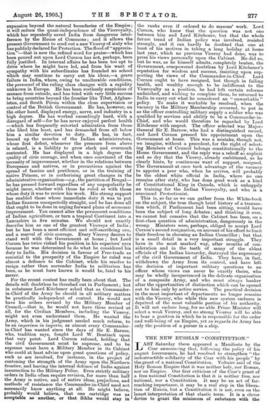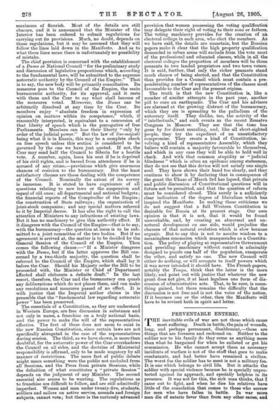THE NEW RUSSIAN " CONSTH U maximum of flourish. Most
of the details are still obscure, and it is announced that the Minister of the Interior has been ordered to submit regulations for carrying out its provisions. Much, no doubt, depends on these regulations, but it may be assumed that they will follow the lines laid down in the Manifesto. And as to what these lines mean there is unfortunately no possibility of mistake.
The chief provision is concerned with the establishment of a Duma or National Council "for the preliminary study and discussion of legislative propositions which, according to the fundamental laws, will be submitted to the supreme autocratic authority by the Council of the Empire." That is to say, the new body will be primarily consultative. Its measures pass to the Council of the Empire, the main bureaucratic authority, for its approval, and. it rests with them and. the Ozar to say what shall become of the measures voted. Moreover, the Duma can be arbitrarily dissolved at any time by the Czar. Its members enjoy "absolute freedom in expression of opinion on matters within its competence,' which, if reasonably interpreted, is equivalent to a concession of that liberty of speech which is the prerogative of free Parliaments. Members can lose their liberty "only by order of the judicial power." But the law of lese-majeste being what it is in Russia, this may be a complete check on free speech unless this section is considered. to be governed by the one we have just quoted. If not, the Czar may send half the Council to Siberia for a hostile vote. A member, again, loses his seat if he is deprived of his civil rights, and is barred from attendance if he is accused of any crime,—provisions which give enormous chances of coercion to the bureaucracy. But the least satisfactory clauses are those dealing with the competence of the Council. Nominally the extent of its survey is immense. It is stated to have cognisance of all questions relating to new laws or the suspension and repeal of old ones ; all departmental and national budgets; the financial reports of the Comptroller of the Empire; the construction of State railways ; the organisation of joint-stock companies; and any special matters referred to it by Imperial decree. It has also the right to call the attention of Ministers to any infractions of existing laws. But it has no machinery to give this authority effect. If it disagrees with the Council of the Empire—that is to say, with the bureaucracy—the question at issue is to be sub- mitted to a joint committee of the two bodies. But if no agreement is arrived at, the matter is to be decided by the General Session of the Council of the Empire. Then comes the following clause :—" If a Minister disagrees with the Duiruz, but if the latter approves the Bill con- cerned by a two-thirds majority, the question shall be referred to the Council of the Empire, which shall lay it before the Czar. Should his Majesty order the Bill to be proceeded with, the Minister or Chief of 'Department affected shall elaborate a definite draft." In the last resort, therefore, the Czar and the bureaucracy can quash any deliberations which do not please them, and can make any resolutions and measures passed of no effect. It is with justice that the Imperial author claims in the preamble that the "fundamental law regarding autocratic power" has been preserved. The essentials of a Constitution, as they are understood in Western Europe, are free discussion in substance and not only in name, a franchise on a truly national basis, and the power to make the will of the representatives effective. The first of these does not seem to exist in the new Russian Constitution, since certain laws are not specifically abrogated in the case of the representatives during session. The third, as we have shown, is more than doubtful, for the autocratic power of the Czar overshadows the Council on all sides, and the doctrine of Ministerial responsibility is affirmed, only to be made nugatory by all manner of restrictions. The mere fact of public debate might mean something were the public not excluded from all Sessions, and the Press from private Sessions, while the definition of what constitutes a "private Session" depends on the judgment of any Minister. The second essential also seems to be wanting. The regulations as to franchise are difficult to follow, and are still admittedly imperfect. Women and men under twenty-five, students, soldiers and sailors on active service, nomads and foreign subjects, cannot vote; but there is the curiously advanced provision that women possessing the voting qualification may delegate their right of voting to their sons or fathers. The voting machinery provides for the creation of au electoral college in each area, who elect the members. As we have said, the details are uncertain, but the Russian papers make it clear that the high property qualification demanded in urban areas will exclude from the vote most of the professional and educated classes, while in all the electoral colleges the proportion of members will be three peasants to two landed proprietors and two town voters. it is said, further, that only the richer peasants stand much chance of being elected, and that the Constitution thus provides for a Council which must contain a pre- ponderating number of representatives of the classes most favourable to the Czar and. the present regime.
The truth is that the new Constitution is, like a number of similar attempts in the past year, another pill to cure an earthquake. The Czar and his advisers are alarmed at the growing distrust of the bureaucracy, which they see is spreading to the palladium of the autocracy itself. They dislike, too, the activity of the "intellectuals," and such events as the recent Zemstvo Congress in Moscow. They see that the time has gone by for direct muzzling, and, like all short-sighted people, they try the expedient of an unsatisfactory compromise. They create a kind of Constitution, in- volving a kind of representative Assembly, which they believe will contain a majority favourable to themselves, and which in any case they will be able to hold well in check. And with that common stupidity or "judicial blindness" which is often an epidemic among statesmen, they do not see that this device will not satisfy one single soul. They have shown their hand too clearly, and. they continue to show it by declaring that in consequence of the grant the Ukase of March 3rd has lapsed, that private and public discussion of Constitutional questions will in future not be permitted, and that the question of reform must be considered closed. This surely is a sufficiently clear indication of the degree of liberalism which has inspired the Manifesto. In making these criticisms we do not suggest that a full Western Confititution is desirable for Russia at its present stage. Our own opinion is that it is not, that it would be found unworkable, and, by creating an abnormal and un- natural development on one side, would prejudice the chances of that natural evolution which is slow because organic. But to say this is not to ascribe wisdom to a meaningless concession which masquerades as a Constitu- tion. The policy of playing at representative Government and providing machinery without control is admirably designed to puzzle one half of the population, exasperate the other, and satisfy no one. The new Council will either do nothing, or will arrogate to itself powers which it was never intended it should have. The French papers, notably the Temps, think that the latter is the more likely, and point out with justice that whatever the new grant does not give, it at least legalises one form of dis- cussion of administrative acts. That, to be sure, is some- thing gained, but there remains the difficulty that the discussion is not free and is not the voice of the nation. If it becomes one or the other, then the Manifesto will have to be revised both in spirit and letter.



































 Previous page
Previous page